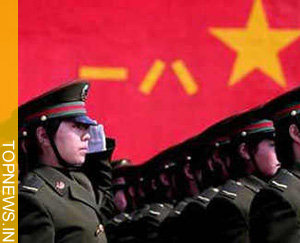China defends its rise in military spending
Beijing - China on Tuesday defended a sharp rise in military spending, saying the increase in its defence budget was necessary because of the military supremacy of other states, a need for modernization of its armed forces and because of the need to fight separatists at home.
 In a white paper on China's National Defence in 2008, issued by the Information Office for the State Council, officials said China had an increasingly need to ensure social peace.
In a white paper on China's National Defence in 2008, issued by the Information Office for the State Council, officials said China had an increasingly need to ensure social peace.
"China is faced with the superiority of the developed countries in economy, science and technology, as well as military affairs. It also faces strategic maneuvers and containment from the outside while having to face disruption and sabotage by separatist and hostile forces from the inside," the paper said.
Around the world "struggles for strategic resources, strategic locations and strategic dominance have intensified," the paper said. Power policies and hegemonism continued to exist.
China's military spending continues on a high level, the paper showed. However, no figures were given. In 2008, the official defence budget was increased by 17.5 per cent. Between 1998 and 2007 the annual increase averaged at 15.9 per cent.
However, the US Department of Defense, the Pentagon, believes actual defence spending of the People's Liberation Army is two to three times as big as indicated in the white paper. According to the white paper, China' defence spending amounts only to 7.5 per cent of the US defence budget and 61 per cent of Britain's.
China was facing a containment policy from abroad, the white paper said. The United States shifted its action increasingly to the Asia-Pacific region, strengthened alliances and expanded its military capabilities.
Disputes over territory or usage of the seabed were serious. All states were increasingly underscoring diplomatic efforts by military means, it said.
"Some major powers" increased their military spending, sped up transformation of their armed forces and developed advanced military technologies, it said, adding that nuclear arms, military use of space and missile defence were at the centre of those activities.
Referring to easing tensions between China and Taiwan, which Beijing regards as a renegade province, the white paper concludes that China's overall security situation has improved, although the People's Republic still faced "long-term and complicated" threats.
Separatist forces were working towards independence for Taiwan, former east Turkestan in Xinjian in north-west China and Tibet. New threats, caused by terrorism, natural disasters and economic insecurity were on the rise, the paper said. (dpa)